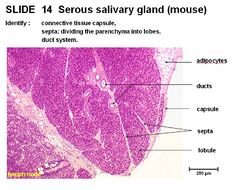Difference between revisions of "Serous Salivary Gland - Anatomy & Physiology"
Jump to navigation
Jump to search
m (Text replace - "Category:To Do - Review" to "Category:To Do - AP Review") |
|||
| Line 6: | Line 6: | ||
Intralobular ducts run within the lobules. Striated intralobular ducts lined with cuboidal epithelium. Intercalated intralobular ducts lined with low cuboidal to simple squamous epithelium. Serous acini secrete a watery solution rich in proteins with spherical nuclei. Cells are pyramidal, cuboidal or crescent shaped. | Intralobular ducts run within the lobules. Striated intralobular ducts lined with cuboidal epithelium. Intercalated intralobular ducts lined with low cuboidal to simple squamous epithelium. Serous acini secrete a watery solution rich in proteins with spherical nuclei. Cells are pyramidal, cuboidal or crescent shaped. | ||
| − | |||
| − | |||
[[Category:Salivary Glands - Anatomy & Physiology]] | [[Category:Salivary Glands - Anatomy & Physiology]] | ||
[[Category:To Do - AimeeHicks]][[Category:To Do - AP Review]] | [[Category:To Do - AimeeHicks]][[Category:To Do - AP Review]] | ||
Revision as of 17:07, 10 December 2010
Overview
The serous salivary gland has a connective tissue capsule and septa dividing the parenchyma into lobes. There is a duct system. Interlobular ducts run in the tissue septum lined by cuboidal to columnar epithelium.
Intralobular ducts run within the lobules. Striated intralobular ducts lined with cuboidal epithelium. Intercalated intralobular ducts lined with low cuboidal to simple squamous epithelium. Serous acini secrete a watery solution rich in proteins with spherical nuclei. Cells are pyramidal, cuboidal or crescent shaped.
